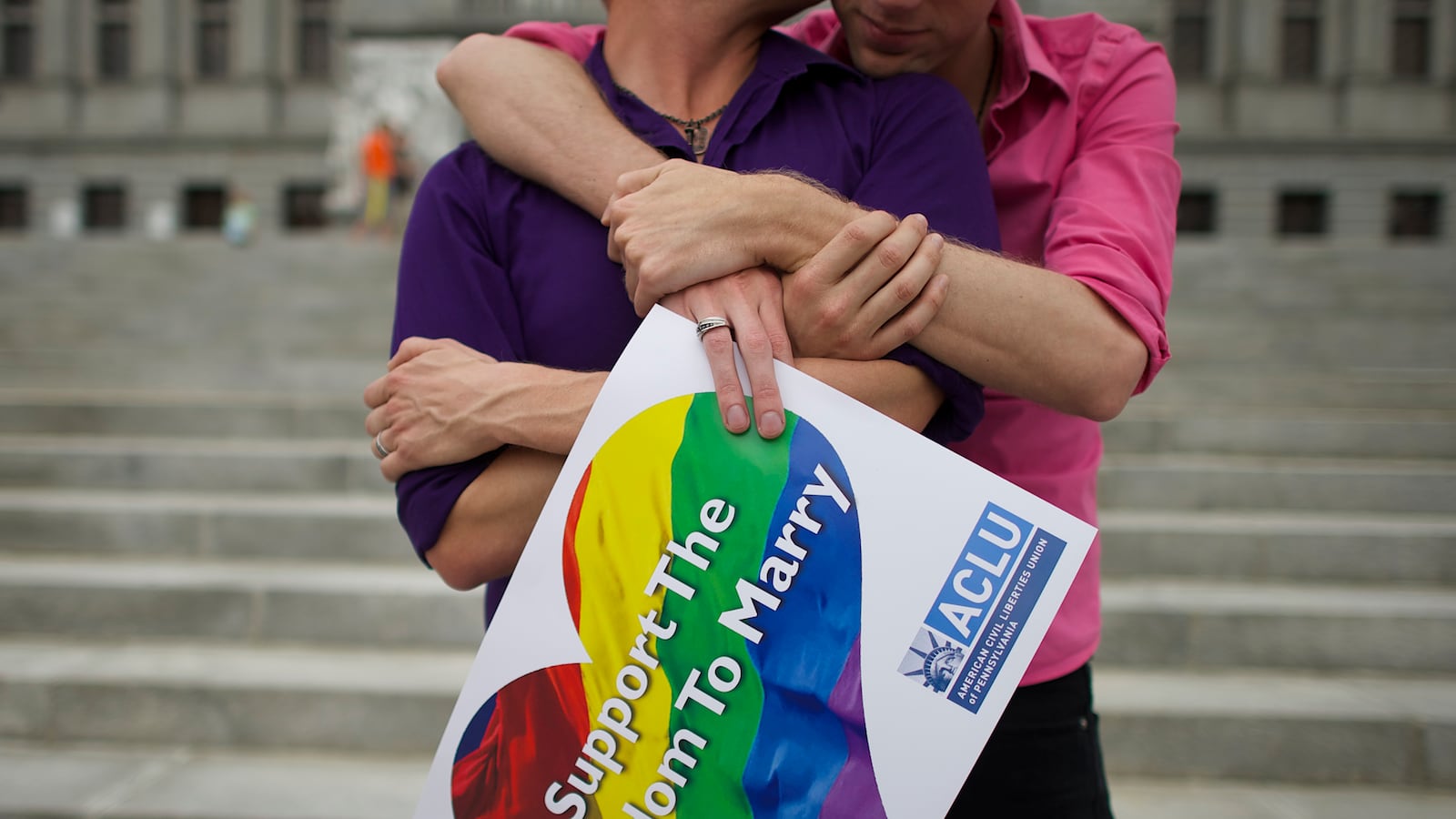Marriage was the dog that didn’t bark, not even whimper, in the midterm elections. It certainly wasn’t a centerpiece, and it didn’t even surface as a sideline issue. Silence was clearly the preferred strategy of Republican candidates up and down the ballot.
After the Supreme Court effectively green-lit marriage for same-sex couples in 11 new states last month, we barely heard a peep from the GOP. High-profile candidates in deeply conservative states, like Senator Mitch McConnell (KY) and Representatives Tom Cotton (AR) and Bill Cassidy (LA), didn’t even issue a statement on the Court’s headline-grabbing, historic decision. The Republican candidate for governor in Oregon, on the other hand, touted her support for the freedom to marry in a TV ad.
As George W. Bush’s media adviser Mark McKinnon likes to say of the freedom to marry, “The wedge has lost its edge.”
What a difference a decade makes. That’s when Karl Rove weaponized the issue during his boss’s 2004 presidential campaign, shamefully putting marriage discrimination on state ballots in an effort to turn out base support. Countless Republican candidates in federal and state elections followed that blueprint in the next three cycles, using opposition as red meat to try to draw out base voters.
But times have changed. Today two thirds of the country- or 221 million Americans—will soon be living in a state with the freedom to marry. A rock-solid majority of Americans—which includes significant numbers of Republicans, Independents, and young evangelicals—believe in the basic dignity and individual freedom of gay couples marrying. Even in these off-year elections, when voters skew considerably older than in presidential years, exit polls showed a plurality support the freedom to marry. And while there’s crucial work left to do—particularly in the Deep South, where same-sex couples have in the main been left behind—no other social movement has seen such broad success in changing hearts, minds, and even laws in a single decade.
So where do the politics of marriage go from here? And will it be a factor in the 2016 presidential race?
Whoever seeks the Democratic nomination will embrace the freedom to marry. Support is now part of the party’s DNA (which, by the way, was not the case in the last primary). And new evidence shows the cause is a turnout motivator for Democratic base voters.
The Republican approach will be more interesting. Candidates will be figuring out whether to use the old formula and appeal to a dwindling base of older social conservatives who turn out disproportionately in primaries. Alternatively, they could choose a different course, trying to skirt the issue through the primaries while maintaining an appeal to general election swing voters, a great majority of whom back marriage for gay couples and find discrimination objectionable.
Conservative darling Senator Ted Cruz has made his choice, seeking to build up the anti-gay brand, perhaps in anticipation of running. After the big Supreme Court news last month, Cruz proposed a constitutional amendment allowing states to ignore the courts striking down marriage bans.
Yet by the time the primaries roll around, loud and overt opposition like Cruz’s will be the exception, not the rule. Preserving the potential for appeal in a general election—and the prospect for a future in politics given how quickly opinions are shifting—will carry the day. Most candidates will do what they can to avoid the issue altogether. Silence is golden. Discrimination against loving couples just doesn’t sell like it used to, and they all know it.
Another compelling reason for them to steer clear: Most court watchers believe the freedom to marry will be the law of the land by June 2016, just before nominees are officially chosen in either party. Mainstream GOP candidates will be inclined to hew to the playbook Wisconsin Governor Scott Walker used this year even as the courts ended his state’s marriage ban in the midst of his reelection campaign: it’s settled law, out of my hands, let’s move on.
And then there’s the case of Senator Rob Portman of Ohio, who spoke out with eloquence in support of his gay son’s right to marry and is considering a run. His approach on marriage, combined with solid conservative credentials, could offer up a model of the future of the GOP.
The Republican National Committee released a post-2012 election report making the case that anti-gay rhetoric and intolerance alienated voters under the age of 30—voters who will be in their mid-30s in 2016. The report highlights the generational divide on gay rights among conservatives, noting, “for many younger voters these issues [like marriage] are a gateway into whether the Party is a place they want to be.” The RNC’s prescription: chill out on the marriage issue.
The bottom line: mainstream candidates from both parties are much more likely to showcase empathy when it comes to gay families and marriage. For the Democrats, stalwart support for the freedom to marry has already become second nature, a prerequisite in order to be taken seriously. For Republicans, the 2016 cycle will show us whether old dogs have learned new tricks. Let the race begin.
Marc Solomon is the National Campaign Director of Freedom to Marry and author of Winning Marriage: The Inside Story of How Same-Sex Couples Took on the Politicians and Pundits—and Won.






